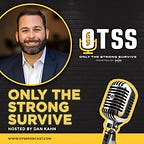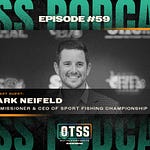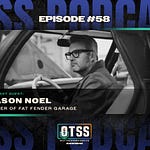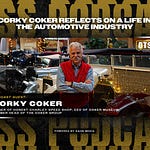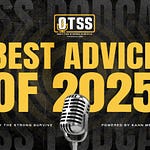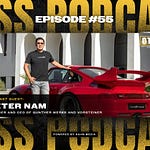RJ de Vera has had an amazing career arc. Like many Southern California kids, he had childhood dreams of Ferraris and muscle cars. However, his automotive interests shifted to Japanese imports during his teenage years. Soon, RJ was traveling to Japan to check out car shows and find rare parts.
His early expertise in the Japanese tuner car scene, before it gained widespread popularity, opened other doors. RJ was tapped to help with the launch of Super Street magazine and would serve as its editor-at-large. From there, he became an advisor for the first “Fast and Furious” movie, even playing the role of street racer Danny Yamato in the premier installment of the radically popular franchise.
After his Hollywood debut, RJ helped build the Motegi wheel brand before heading marketing efforts at Meguiar’s. He now serves as the vice president of marketing for the Specialty Equipment Market Association (SEMA).
From selling auto parts out of his mother’s condo to leading marketing efforts at global brands, RJ has learned a lot from his journey. On this episode of the “Only The Strong Survive” podcast, he shares some of that wisdom with host Dan Kahn.
Click on the icon above to watch the entire episode, and here are our top five takeaways:
The platforms change, but people will always love modifying cars.
Working at a multinational company helps develop a bigger perspective.
The right timing involves envisioning your future self.
Adaptation is a constant need.
Ikigai is worth exploring for anyone seeking career direction and fulfillment.
Modifying Cars Will Always Have a Universal Appeal
When the import craze first took off, many hot rodders and muscle car builders frowned upon it. However, for RJ, what he was doing wasn’t that different from what those hot rodders had done as kids. Yes, the platforms were different, but the love of modifying cars was the same. It is a cycle that RJ sees continuing even today.
“The very first article I was blessed to be featured in was one by Mark Vaughn for Autoweek,” said RJ. “It was called ‘Passing the Flames,” and in it, he said that there is this group of young, rebellious kids modifying and messing around with their cars, much like everybody who came back from the war had done with their muscle cars. They were just doing it on a different platform and recreating the idea of ‘hot rodding’ but with a different platform. We didn’t know it, but it was just fun for us. There is something about customizing your car that appeals to a great group of people that continues to happen over and over.”
A Global Perspective Helps
The jump to work for Meguiar’s was a big one for RJ. Owned by 3M, the car care company was part of a large multinational corporation. While that can be a negative for some, it was positive for RJ, as it helped him develop a global perspective and the ability to look at the big picture.
“It really cut my teeth on what it means to work for a global Fortune 100 multi-national company. I think it really helped me get to my role now by having this perspective that is way more global and way bigger,” said RJ. “I can think at a different level, and I would have never really had that before, because I had consulted for bigger companies, but I was never in the trenches.”
Timing is Everything
The right timing has played a critical role in RJ’s career. From being in on the launches of Super Street magazine and “Fast and Furious” to joining Meguiar’s and SEMA, RJ’s timing has been spot on. However, it hasn’t been random strokes of luck. Instead, making the right moves involves constantly envisioning what you want the future to be.
“Being at Meguiar’s, I felt it was like time for a change. All roads in any big corporate company lead to its headquarters, and I just didn’t see myself in Minnesota, which is where 3M’s headquarters is,” said RJ. “I really wanted to stay in automotive, and a lot of the bigger roles were beyond Meguiar’s at the end of the day.”
You Have to Adapt
SEMA is the largest and most influential association for the automotive aftermarket, an industry undergoing significant changes. To keep its members ahead of these changes, SEMA has had to adapt and evolve as well. For RJ, changing as an association is just as important as evolving as a business. If neither adapts, they will all get left behind.
“Change happens so much quicker than it did 30 years ago. I think that is something we (SEMA) are embracing more and more because we have to,” said RJ. “We have to change quicker, we have to evolve quicker. Sometimes we have to push some of our industry because there are people who don’t want to change. But for us to prolong this industry and continue to help our members and the businesses in it find success, we have to be that catalyst.”
Get Your Ikigai On
Ikigai is a compound of the two Japanese words “iki” and “kai,” which roughly translates to “a reason for living.” However, the concept of Ikigai builds on this translation by finding fulfillment through aligning one’s passion with their skills. For anyone looking to start their career, RJ notes that Ikigai is well worth exploring.
“Everyone says to find your passion, but I think there is more to it than that. There is this philosophy called Ikigai. It comes out of Japan, and it is this idea that you merge your passion and your skill,” said RJ. “So, what do you love, what are you passionate about, what are you good at, what does the world need and what can you get paid for? My advice to people would be to find the center point of all of those things. If you love car culture, develop the right skill set in something that can help you make a living, which is hopefully something that this culture and world needs. I think that is where you find success.”


